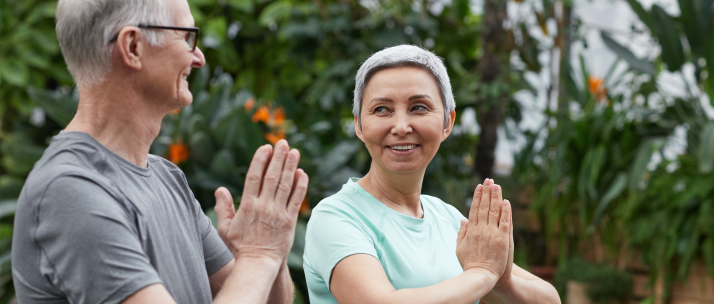
How to practise self-care
Peer reviewed by Dr Colin Tidy, MRCGPLast updated by Victoria RawLast updated 3 Sept 2025
Meets Patient’s editorial guidelines
- DownloadDownload
- Share
- Language
- Discussion
Self-care is a term that resurfaces time and time again. But is it more than just a buzzword? We explore what it really means and how it can benefit your overall health.
In this article:
'Self-care' describes the actions, however small, people take to protect and improve their health and wellbeing.
Dr Knut Schroeder, GP and founder and director of Expert Self Care, explains that self-care in long-term health conditions includes everything that people can do between appointments to help improve their wellbeing.
This includes:
Staying active.
Eating healthily.
Maintaining social relationships.
If you are battling with low self-esteem, anxiety, depression, a long-term health condition or poor work-life balance, here are a few tips to help.
Continue reading below
Be mindful
If you often find yourself overwhelmed, mindfulness meditation might be worth a go. Many people dismiss the technique, believing it requires sitting in silence for 30-60 minutes of the day. Adiba Osmani, co-founder of drop-in meditation studio Inhere, insists that this is not the case. All you need is a few minutes.
She says: "It's about keeping centred, taking in what's around you, and then coming back to an anchor - yourself."
Osmani recommends setting aside just five minutes of your day to practise mindfulness. If you want to feel focused, try setting your morning alarm slightly earlier to meditate before work and think about what you want to achieve that day. If you want to relax, try in the evening before bed to improve your sleep.
"Follow your breath to settle your attention, then focus on everything around you as you continue your breathing," Osmani suggests. "Become completely absorbed in what you can hear, feel, smell or see."
If you’re not someone who can switch off, persistence is key. She suggests focusing on something that resonates with you, such as a piece of music.
For more tips on guided breathing, experiment with these relaxation exercises. You can also try guided meditation through specialist apps, or look for a class near you.
Try yoga
Back to contentsYoga is hailed as one of the best exercises to improve your mental health, as well as helping to relieve migraines, arthritis and asthma.
Liz Oakley, yoga instructor at MoreYoga, explains that practising yoga in the morning before work can make you more productive and more focused, boosting your energy levels for the day.
She says: "Practising after work can help to reduce stress, calm the mind, soothe any aches or tensions from the day and improve your sleep."
If you want to try your hand at yoga, but aren’t sure about attending a class, try watching Yoga With Adriene. Her popular YouTube videos can be done from the comfort of your living room and cater to all abilities.
Continue reading below
Fresh air
Back to contentsWe're constantly told exercise improves our mental health, but it can feel like a conflict - you need a mental boost to start exercising, but you need to exercise to get that mental boost.
Start small
A walk around the block can help clear your head after a stressful day, or a short 20-minute jog. If you feel this helps, it may even inspire you to run your first 10k.
Public Health England advises making time for 150 minutes - 2.5 hours - of moderate exercise a week, which equates to 30 minutes of brisk walking a day, five days a week. The good news is, you can get much of the benefit from just 10 minutes of brisk walking a day, if you get your heart and breathing rates up. To fit this into your everyday life, try getting off a stop early on the bus or train during your commute if possible.
Stock up on vitamin D
Back to contentsThe lack of sunshine in autumn and winter leaves many people feeling depressed. This is called seasonal affective disorder (SAD). As we can’t naturally get enough vitamin D during these months in the UK, or make up for deficiency through diet changes, the government recommends taking a daily supplement of vitamin D during the winter months - or all year round for some people with a high likelihood of deficiency.
Continue reading below
Get some rest
Back to contentsThe average adult needs between 7-9 hours of sleep a night. If you have trouble sleeping due to anxiety, controlled breathing can help clear the mind and relax the body. There are plenty of guided breathing exercises for sleep available, but having a phone close to where you sleep may not help your insomnia.
If you feel stressed in the mornings, try setting your alarm earlier to prepare for the day ahead. Make time to eat a nutritious breakfast to fuel your body and mind, or write a list of what you need to do that day.
Trust your gut
Back to contentsYour brain and gut are more in sync than you think. The 'gut-brain axis' describes the link between the two.
Laura Tilt, a registered dietitian at Tilt Nutrition explains that this information superhighway not only transmits signals that control digestion and the movement of waste through your gut, but also connects your brain’s emotional centres with digestive function.
If you often rely on a sweet treat to cheer you up, Tilt warns that this may actually be counterproductive. Research suggests gut bacteria may potentially influence our mood, so it's one more reason to eat for your microbiome.
"High-sugar, low-fibre foods such as sweets and biscuits light up the pleasure centres in our brain, giving us temporary distraction when we feel low in mood or in need of an energy fix," she says. "But these types of food aren't that helpful for our gut bacteria (microbiome), which love fibre-rich, nutrient-dense foods."
Tilt's top tips for smarter snacking
Tilt recommends you focus on nuts, and the occasional piece of dark chocolate, as they are rich in polyphenols.
"These are naturally occurring compounds found in many plant foods, which help feed your gut bacteria," she explains. "Homemade energy balls - using oats, dried fruit and nuts - are also a good option for longer-lasting energy, and offer a fibre boost for your microbiome."
A healthy, balanced diet will benefit your mental health and fuel you for longer through stressful periods. Tilt's takeaway self-care tips for a healthy gut include taking a probiotic to aid good gut bacteria, making time to unwind and eating a wide range of colourful vegetables and wholegrain foods.
Check out self-care apps
Back to contentsDigital self-help apps have grown in popularity, with many being available for free as an accessible quick fix for those with anxiety.
Liz Ritchie, a psychotherapist based in Northampton, UK believes mental health apps can be beneficial if you are waiting for treatment.
She says: "Many people with mental health issues are waiting an unacceptable level of time before accessing treatment. But apps are ostensibly free and non-judgemental, and there are no waiting lists."
Schroeder recommends choosing apps assessed by the Organisation for the Review of Care and Health Applications (ORCHA) as they have undergone formal assessment.
There have also been studies linking excessive social media use to increased anxiety and depression, so taking a digital detox may improve your mood and sleep behaviour.
Ask for help
Back to contentsStudies have shown that socialising can combat depression and reduce your chance of developing dementia.
Ritchie says: "A social or familial support system can be fundamental to your self-care. People with strong social support experience less stress and exhibit better overall health than those who are socially isolated."
If you feel that at-home self-care isn’t providing the support you need to manage your mental health, talking therapies such as cognitive behavioural therapy (CBT) or psychotherapy can help with anxiety and depression.
Your pharmacist can also help you with self-care if you have a minor condition such as a sore throat or a cold. They will assess your symptoms, taking into account other medicines and long-term health conditions before advising you on treatment. With building pressure on the NHS and antibiotic resistance, treating minor illnesses with self-care is better for everyone.
Keep it up
Back to contentsHannah Daisy, an occupational therapist explains that self-care can be as simple as remembering to take your medicine, picking your socks up off the floor or opening a window.
Make your daily self-care window non-negotiable. Whether it's five minutes of meditation or getting round to something you’ve been meaning to do, pencilling in a little 'me time' no matter how small, is a handy tool for stress management.
Patient picks for Stress management

Mental health
How to deal with stress through exercise
There’s strong evidence to suggest that staying active helps us cope with stress - and as the cost of living rises, so does the prevalence of burnout. Exercise and other techniques can help deal with signs of stress while you get to the root of the problem
by Amberley Davis

Mental health
Which foods can reduce your stress and anxiety?
Anxiety can be complex and hard to navigate, but by making small swaps to what you eat, you could see big improvements in your mental wellbeing. With the help of a food scientist and nutrition coach, we unpack the best foods for anxiety to help put you back in control.
by Lynn Stephen
Article history
The information on this page is peer reviewed by qualified clinicians.
Next review due: 2 Sept 2028
3 Sept 2025 | Latest version
14 Nov 2018 | Originally published
Authored by:
Georgia Gallant

Ask, share, connect.
Browse discussions, ask questions, and share experiences across hundreds of health topics.

Feeling unwell?
Assess your symptoms online for free
Sign up to the Patient newsletter
Your weekly dose of clear, trustworthy health advice - written to help you feel informed, confident and in control.
By subscribing you accept our Privacy Policy. You can unsubscribe at any time. We never sell your data.